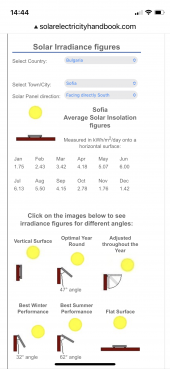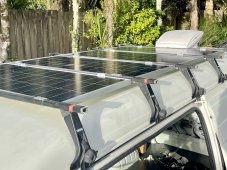Hello everyone,
I'm new to the forum, although I've read quite a few topics in it over the past 2 weeks or so.
I found the site by a youtube video where Will was discussing pros and cons to the 12v and 24v systems.
So as the thread title suggests, I recently bought a van with the intention to convert it to camper (yeah, I know everyone seems to be doing that lately...). Unfortunately for me, the electrical system is the thing I'm the least comfortable with during this build. I'll start by stating what my intended use for this van is going to be.
I will mostly travel with it for 3 or 4 days, wild camping with my wife and 1 child. As we're both working remotly, having 220v AC to charge the laptops is mandatory, so an inverter is inevitable. Other power consummators will be the phones, which can charge off 12V, lighting in the van and a 12v small top loading compressor fridge (by the specs, consuming 60W, but I reckon it won't be working full time).
The battery is going to be a 12V one, between 150-200A. With these in mind, I have a few questions:
1/ First question is - would I be able to use a 24V panel(s) through the controller to charge the 12V battery - I actually know it's possible, the question is whether there are any pros and cons to that. So far I've read opinions on both ends - that it's actually good because the controller will charge the battery faster, others have said that it's a bad idea as the system won't be efficient.
2/ My second question is regarding how I arrange the panels. I'm aiming to have panels in the range of 300-400 Watts. Should I strap 2 175-200W ones on the roof, or is it a better idea to maybe have something like a 200W single panel on the roof with maybe another 100-150W mobile which I can move around the van for better positioning and use a second controller for this to charge the battery?
I think these are the things I'm mostly interested in currently so that I have an idea how to plan.
I can buy a reasonably priced 200W 24V panel and I lean towards the idea of having 1 of these on the roof with another mobile 100-150 panel to move around.
Thanks to anyone that cared to read these rumblings
I'm new to the forum, although I've read quite a few topics in it over the past 2 weeks or so.
I found the site by a youtube video where Will was discussing pros and cons to the 12v and 24v systems.
So as the thread title suggests, I recently bought a van with the intention to convert it to camper (yeah, I know everyone seems to be doing that lately...). Unfortunately for me, the electrical system is the thing I'm the least comfortable with during this build. I'll start by stating what my intended use for this van is going to be.
I will mostly travel with it for 3 or 4 days, wild camping with my wife and 1 child. As we're both working remotly, having 220v AC to charge the laptops is mandatory, so an inverter is inevitable. Other power consummators will be the phones, which can charge off 12V, lighting in the van and a 12v small top loading compressor fridge (by the specs, consuming 60W, but I reckon it won't be working full time).
The battery is going to be a 12V one, between 150-200A. With these in mind, I have a few questions:
1/ First question is - would I be able to use a 24V panel(s) through the controller to charge the 12V battery - I actually know it's possible, the question is whether there are any pros and cons to that. So far I've read opinions on both ends - that it's actually good because the controller will charge the battery faster, others have said that it's a bad idea as the system won't be efficient.
2/ My second question is regarding how I arrange the panels. I'm aiming to have panels in the range of 300-400 Watts. Should I strap 2 175-200W ones on the roof, or is it a better idea to maybe have something like a 200W single panel on the roof with maybe another 100-150W mobile which I can move around the van for better positioning and use a second controller for this to charge the battery?
I think these are the things I'm mostly interested in currently so that I have an idea how to plan.
I can buy a reasonably priced 200W 24V panel and I lean towards the idea of having 1 of these on the roof with another mobile 100-150 panel to move around.
Thanks to anyone that cared to read these rumblings





